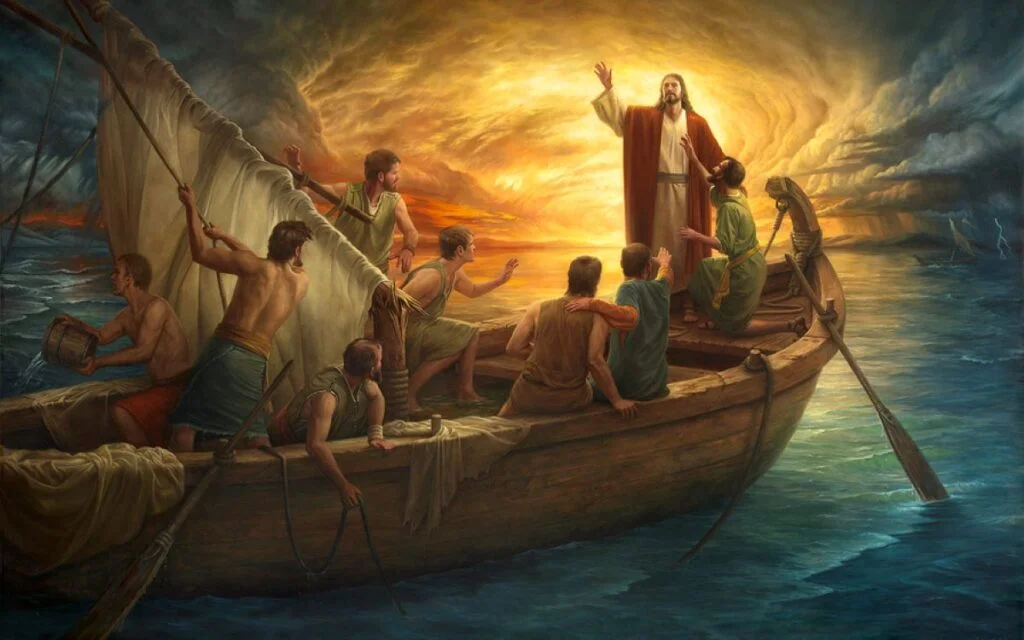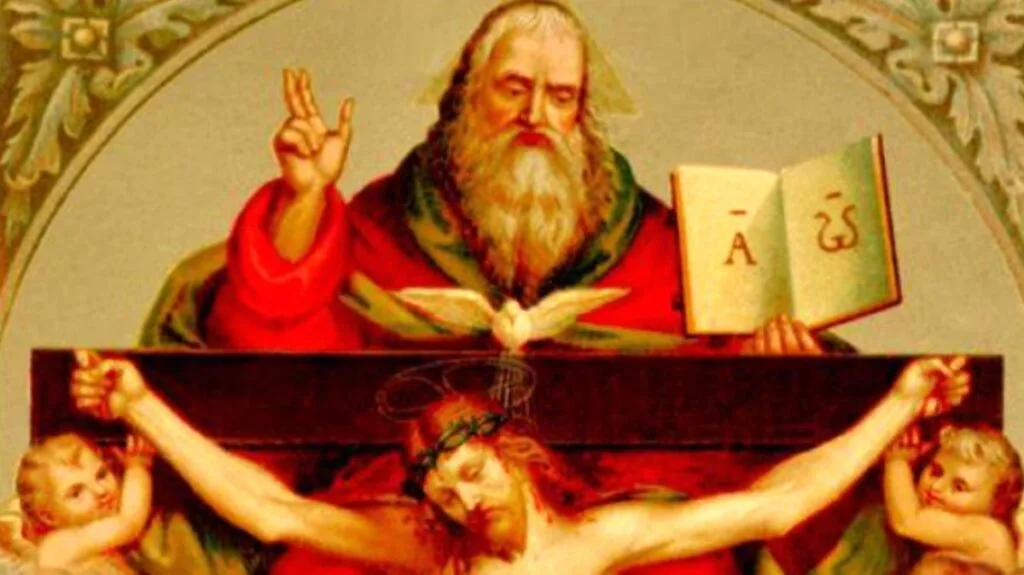POPE FRANCIS ON THE 17TH SUNDAY IN ORDINARY TIME YEAR A
Parables of the hidden treasure, of the pearl, and of the fishing net.

ANGELUS ADDRESS
30 July 2023
Dear brothers and sisters, buongiorno!
Today the Gospel tells the parable of a merchant in search of precious gemstones, who, Jesus says, “on finding one pearl of great value, went and sold all that he had and bought it” (Mt 13:46). Let us pause a little on the actions of this merchant, who first seeks, then finds and finally buys.
This man’s first action: to seek. He is an enterprising merchant, who does not stand still, but leaves his house and sets out in search of precious pearls. He does not say: “I am satisfied with the ones I have”; he looks for more beautiful ones. And this is an invitation for us not to close ourselves up in habit, in the mediocrity of those who are complacent, but to revive desire: to revive the desire, so that the desire to seek, to go on, is not extinguished; to cultivate dreams of good, to seek the newness of the Lord, because the Lord is not repetitive, He always brings newness, the newness of the Spirit; He always makes the realities of life new (cf. Rev 21:5). And we must have this attitude: to seek.
The merchant’s second action is to find. He is a shrewd person who “has a keen eye” and knows how to recognize a pearl of great value. This is not easy. Let us think, for example, of the fascinating oriental bazaars, where the stalls, full of goods, are crowded along the walls of streets full of people; or of some of the stalls one sees in many cities, full of books and various objects. Sometimes in these markets, if one stops to look closely, one can discover treasures: precious things, rare volumes that, mixed in with everything else, one does not notice at first glance. But the merchant in the parable has a sharp eye and knows how to find, he knows how to “discern” to find the pearl. This too is a teaching for us: every day, at home, on the street, at work, on holiday, we have the possibility of discerning good. And it is important to know how to find what counts: to train ourselves to recognize the precious gems of life and to distinguish them from junk. Let us not waste time and freedom on trivial things, pastimes that leave us empty inside, while life offers us every day the precious pearl of the encounter with God and with others! It is necessary to know how to recognize it: to discern in order to find it.
And the merchant’s last action: he buys the pearl. Realizing its immense value, he sells everything, he sacrifices all his goods just to have it. He radically changes the inventory of his warehouse; there is no longer anything other than that pearl: it is his only wealth, the meaning of his present and his future. This too is an invitation for us. But what is this pearl for which one can renounce everything, the one of which the Lord speaks to us? This pearl is Him: it is the Lord! Seeking the Lord and finding the Lord, encountering the Lord, living with the Lord. The pearl is Jesus: He is the precious pearl of life, to be sought, found and made one’s own. It is worth investing everything in Him because, when one encounters Christ, life changes like this, doesn’t it? Your life … you meet Christ and in this way your life changes.
Let us then resume the merchant’s three actions: seeking, finding and buying – and ask ourselves some questions. Seeking: am I searching, in my life? Do I feel fine, accomplished, am I satisfied, or do I exercise my desire for good? Am I in spiritual retirement? How many young people are in retirement! The second action, finding: do I practise discerning what is good and comes from God, knowing how to renounce what leaves me with little or nothing? Finally, buying: do I know how to spend myself for Jesus? Is He in first place for me, is He the greatest good in life? It would be nice to say to Him today: “Jesus, You are my greatest good”. Each one of you in your heart, say now: “Jesus, you are my greatest good”.
May Mary help us to seek, find and embrace Jesus with all of ourselves.
Source: https://press.vatican.va/content/salastampa/en/bollettino/pubblico/2023/07/30/230730a.html

ANGELUS ADDRESS
26 July 2020
Dear brothers and sisters, good day!
This Sunday’s Gospel reading (see Mt 13:44-52) consists of the final verses of the chapter Matthew devotes to the parable of the Kingdom of Heaven. The passage includes three parables that are very briefly outlined: that of the hidden treasure, that of the precious pearl, and that of the net cast into the sea.
I will look at the first two in which the Kingdom of Heaven is compared to two different “precious” items, namely, the hidden treasure in the field and the pearl of great value. The reaction of he who finds the pearl or the treasure is practically the same: the man and the merchant sell everything to buy what is now most dear to them. With these two similes, Jesus proposes to involve us in the building of the Kingdom of Heaven, presenting an essential characteristic of Christian life, of the life of the Kingdom of heaven: those who fully pledge themselves to the Kingdom are those who are willing to stake everything, who are courageous. Indeed, both the man and the merchant in these two parables sell everything they have, thus renouncing their material security. From this it can be understood that the building of the Kingdom requires not only the grace of God, but also the active willingness of humanity. Everything is done by grace, everything! We need only have the willingness to receive it, not to resist grace: grace does everything but it takes “my” responsibility, “my” willingness … and who is responsible for this?
The gestures of the man and the merchant who seek to buy more precious treasures, depriving themselves of their goods, are decisive gestures, and radical gestures; but I would say that they are “one way” gestures, not a “round trip”: they are “one way” gestures. Moreover, they are gestures made with joy because both of them have found treasure. We are called upon to assume the attitude of these two Gospel figures, so that we too may become healthily restless seekers of the Kingdom of Heaven. It is a matter of abandoning the heavy burden of our worldly sureties that prevent us from searching and building up the Kingdom: the covetousness for possession, the thirst for profit and power, and thinking only of ourselves.
In our times, as we are all aware, some people’s lives can end up mediocre and dull because they probably do not go in search of real treasure: they are content with attractive but fleeting things, whose bright lights prove illusory as they give way to darkness. Instead the light of the Kingdom is not like fireworks, it is light: fireworks last only an instant, whereas the light of the Kingdom accompanies all our life.
The Kingdom of Heaven is the opposite of the superfluous things that the world offers, the opposite of a dull life: it is a treasure that renews life every day and leads it to extend towards wider horizons. Indeed, those who have found this treasure have a creative and inquisitive heart, which does not repeat but rather invents, tracing and setting out on new paths which lead us to love God, to love others, and to truly love ourselves. The sign of those who walk this path of the Kingdom is creativity, always trying to do more. And creativity is what takes life and gives life, and gives, and gives, and gives… It always looks for many other ways to give life.
Jesus, Who is the hidden treasure and the pearl of great value, cannot but inspire joy, all the joy of the world: the joy of discovering a meaning in life, the joy of committing oneself to the adventure of holiness.
May the Blessed Virgin help us to search every day for the treasure of the Kingdom of Heaven, so that the love God has given us through Jesus may be manifested in our words and gestures.

ANGELUS ADDRESS
27 July 2014
Dear Brothers and Sisters, Good morning!
The brief similes proposed in today’s liturgy conclude [17th Sunday in Ordinary Time year A] the chapter of the Gospel of Matthew dedicated to the parables of the Kingdom of God (13:44-52). Among these are two small masterpieces: the parables of the treasure hidden in the field and of the pearl of great value. They tell us that the discovery of the Kingdom of God can happen suddenly like the farmer who, ploughing, finds an unexpected treasure; or after a long search, like the pearl merchant who eventually finds the most precious pearl, so long dreamt of. Yet, in each case the point is that the treasure and the pearl are worth more than all other possessions; and therefore when the farmer and the merchant discover them, they give up everything else in order to obtain them. They do not need to rationalize or think about it or reflect: they immediately perceive the incomparable value of what they’ve found and they are prepared to lose everything in order to have it.
This is how it is with the Kingdom of God: those who find it have no doubts, they sense that this is what they have been seeking and waiting for; and this is what fulfills their most authentic aspirations. And it really is like this: those who know Jesus, encounter Him personally, are captivated, attracted by so much goodness, so much truth, so much beauty, and all with great humility and simplicity. To seek Jesus, to find Jesus: this is the great treasure!
Many people, many saints, reading the Gospel with an open heart, have been so struck by Jesus they they convert to Him. Let us think of St Francis of Assisi: he was already a Christian, though a “rosewater” Christian. When he read the Gospel, in that decisive moment of his youth, he encountered Jesus and discovered the Kingdom of God; with this, all his dreams of worldly glory vanished. The Gospel allows you to know the real Jesus, it lets you know the living Jesus; it speaks to your heart and changes your life. And then yes, you leave it all. You can effectively change lifestyles, or continue to do what you did before but you are someone else, you are reborn: you have found what gives meaning, what gives flavour, what gives light to all things, even to toil, even to suffering, and even to death.
Read the Gospel. Read the Gospel. We have spoken about it, do you remember? To read a passage of the Gospel every day; and to carry a little Gospel with us, in our pocket, in a purse, in some way, to keep it at hand. And there, reading a passage, we will find Jesus. Everything takes on meaning when you find your treasure there, in the Gospel. Jesus calls it “the Kingdom of God”, that is to say, God who reigns in your life, in our life; God who is love, peace and joy in every man and in all men. This is what God wants and it is why Jesus gave himself up to death on the cross, to free us from the power of darkness and to move us to the kingdom of life, of beauty, of goodness and of joy. To read the Gospel is to find Jesus and to have this Christian joy, which is a gift of the Holy Spirit.
Dear brothers and sisters, the joy of finding the treasure of the Kingdom of God shines through, it’s visible. The Christian cannot keep his faith hidden, because it shines through in every word, in every deed, even the most simple and mundane: the love that God has given through Jesus shines through. Let us pray, through the intercession of the Virgin Mary, that His Kingdom of love, justice and peace may reign in us and in the whole world.
ANGELUS ADDRESS
30 July 2017
Dear Brothers and Sisters, Good Morning!
Jesus’ parabolic discourse groups together seven parables in the 13th chapter of the Gospel of Matthew, and concludes with today’s three parallel stories: the hidden treasure (v. 44), the fine pearl (vv. 45-46) and the fishing net (vv. 47-48). I will pause on the first two which highlight the protagonists’ decision to sell everything in order to acquire what they have found. The first case has to do with a farmer who casually happens upon a hidden treasure in the field he is working. As the field is not his property, he must purchase it in order to take possession of the treasure: he therefore decides to risk all his possessions so as not to lose that truly exceptional opportunity. In the second case, there is a merchant of precious pearls; as an expert, he has spied a pearl of great value. He too decides to wager everything on that pearl, to the point of selling all the others.These parallel stories highlight two characteristics regarding possession of the Kingdom of God: searching and sacrifice. It is true that the Kingdom of God is offered to all — it is a gift, it is a present, it is a grace — but it does not come on a silver platter: it requires dynamism; it is about searching, journeying, working hard. The attitude of searching is the essential condition for finding. The heart must burn with the desire to reach the valuable good, that is, the Kingdom of God which is made present in the person of Jesus. He is the hidden treasure; he is the pearl of great value. He is the fundamental discovery who can make a decisive change in our lives, filling it with meaning.
Faced with the unexpected discovery, both the farmer and the merchant realize that they are facing a unique opportunity which should not be missed; hence, they sell all that they own. Assessing the inestimable value of the treasure leads to a decision that also implies sacrifice, detachment and renunciation. When the treasure and the pearl are discovered, that is, when we have found the Lord, we must not let this discovery become barren, but rather sacrifice everything else in order to acquire it. It is not a question of disdaining the rest but of subordinating them to Jesus, putting him in first place; grace in first place. The disciple of Christ is not one who has deprived himself of something essential; he is one who has found much more: he has found the complete joy that only the Lord can give. It is the evangelical joy of the sick who have been healed; of the pardoned sinners, of the thief for whom the doors of heaven open.
The joy of the Gospel fills the heart and the entire life of those who encounter Jesus. Those who allow themselves to be saved by him are freed from sin, sadness, inner emptiness and isolation. With Jesus Christ, joy is always born and reborn (cf. Apostolic Exhortation Evangelii Gaudium, n. 1). Today we are called to contemplate the joy of the farmer and the merchant in the parables. It is the joy of each of us when we discover the closeness and the comforting presence of Jesus in our lives. A presence which transforms the heart and opens us to the needs and the welcoming of our brothers, especially the weakest.
Let us pray for the intercession of the Virgin Mary so that each of us may know how to bear witness, in daily words and gestures, to the joy of having found the treasure of the Kingdom of God, that is, the love that the Father has given us through Jesus.
Stay updated: subscribe by email for free TO OUR NEW WEBSITE www.catholicsstrivingforholiness.org (PUT YOUR EMAIL IN THE SUBSCRIBE WIDGET).
We are also in www.fb.com/Catholicsstrivingforholiness. Kindly help more people in their Christian life by liking our page and inviting your family, friends and relatives to do so as well. Thanks in advance and God bless you and your loved ones! Fr. Rolly Arjonillo